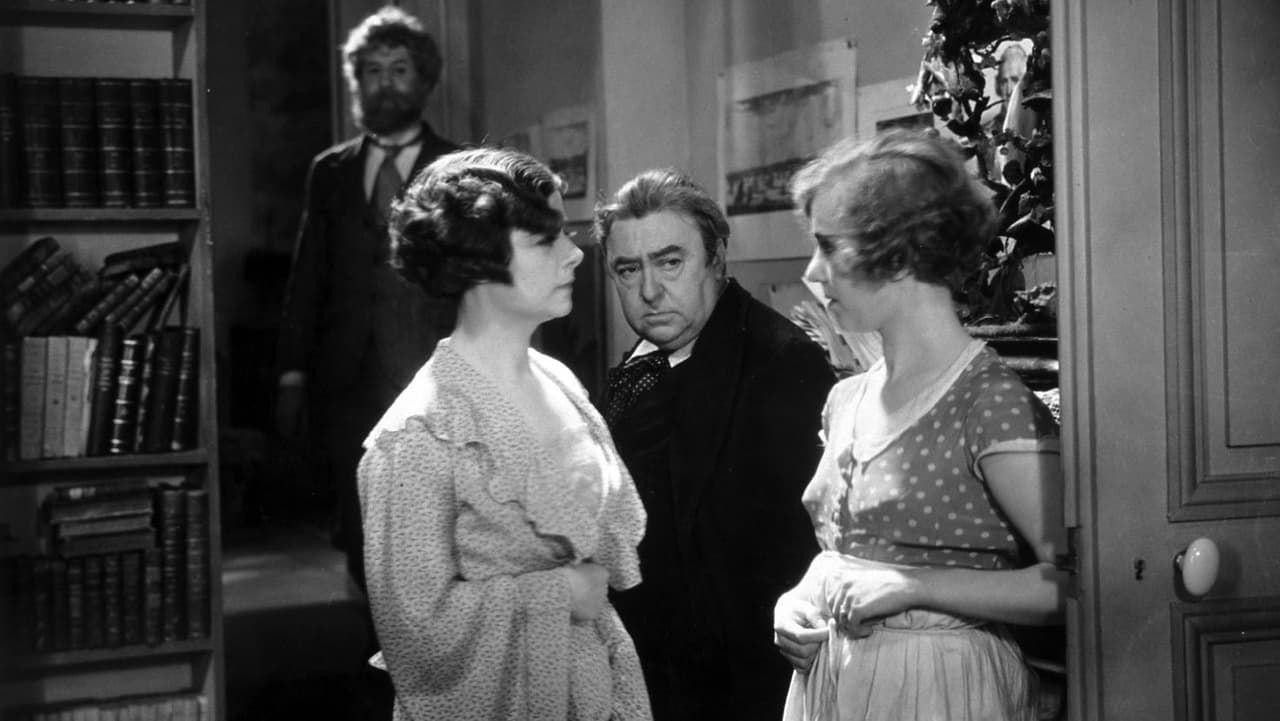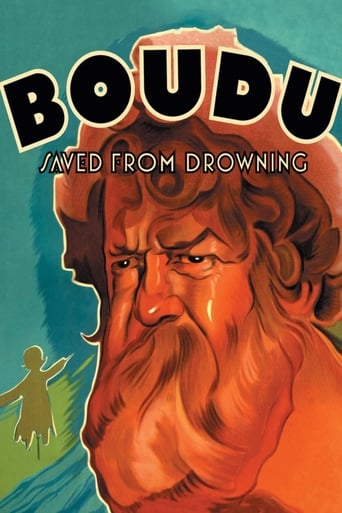

It's Difficult NOT To Enjoy This Movie
... View MoreThe movie turns out to be a little better than the average. Starting from a romantic formula often seen in the cinema, it ends in the most predictable (and somewhat bland) way.
... View MoreThe joyful confection is coated in a sparkly gloss, bright enough to gleam from the darkest, most cynical corners.
... View MoreAll of these films share one commonality, that being a kind of emotional center that humanizes a cast of monsters.
... View MoreAn earlier reviewer noted that Simon's character in Renoir's La Chienne is a "metamorphosis" partner of Boudu. I cannot verify that per se, but it is interesting to point out that many of the stylistic developments in La Chienne carry over into Boudu. There is amazing depth of field - through windows (like Chienne... or M. Lange), exteriors (the hunt for Boudu's dog is exemplary) and especially in the Lestingois house. Renoir utilizes long pans to help construct the space. Again, Renoir positions the camera in a manner where there are obstructions to a full view created by objects in the space. This technique fosters a sense of realism through the unobtrusive camera. Narrow corridors abound and provide for deep staged setups. Renoir is finally liberating the camera and allowing for some of his later 'signature' mobile framing shots. The long take is also being introduced into the stylistic system... one of the final shots of Boudu floating in the canal as the Blue Danube Waltz plays in the soundtrack reminds us that originality in auteurship is still borne of influence and respect (Kubrick's 2001). Renoir also pays some respect to the French Impressionist filmmaker colleagues of his from years past. His novel use of sound as bridges between scenes is as creative and compelling as the ways in which avant-gardists were bridging with images in the silent era. Renoir also continues with practical applications of sound which began in On Purge. He positions a police officer with back facing the camera creating an ominous sense of authority when provided spoken lines. Although I am not a huge fan of Renoir's Hollywood productions, the drowning sequence in Boudu surely influenced some of the action sequences in a film like This Land is Mine (1943). The drowning sequence in Boudu is composed of a montage of shots, with unique angles and povs. The sound during the sequence is diegetic - traffic and crowds - which adds a suspense built around milieu realism as opposed to theatrical drama. Boudu (played excellently by Simon) is an incorrigible rascal whose physical comedy evokes laughing out loud (Chaplin, Keaton and the like). However, there are deep social relationships at play and it isn't so reducible to a critique of "misguided" bourgeois charity. We must be reminded that as sentimental as Boudu can be, it is also clear that he is mentally ill. I find it preposterous to believe that Renoir would be condemning a socio-economic class for diseases of the mind which discriminate against no one. My thesis for now is that Renoir is an impresario of the film medium above all else and as such sought to provide a pleasurable experience for the spectator. The treatment of Boudu remains lighthearted... enough so to not rouse suspicion of moral implications for the scenario. Again, Renoir is not so ambiguous or ambivalent in his politics as he is committed and determined to rendering a film experience that satisfies the myriad of audiences that might be in attendance. To that end he succeeds marvelously with this film.
... View MoreBoudu Saved From Drowning offers a remarkably even-handed look at class relations. While some characters, such as a group of policeman unwilling to help a bum search for his missing dog but all too willing to jump to the aid of a lovely woman missing a more materially valuable animal, obviously behave negatively, others have good points to match their bad. In fact, sometimes the characters from different social classes are almost too similar. The film centers around Lestingois, a generous member of the middle class who is most happy when avoiding his stuffy wife to hang around with his saucy maid. Lestingois risks his life to rescue Boudu, an uncultured bum who loses his desire to continue living once he is parted from his only companion. Oddly enough, Lestingois has also lost one of his closest companions as the film begins, yet he hardly seems to care about his missing friend at all. By contrast, Boudu, a man that generally cares little about those around him, is deeply disturbed by his own loss. Still, once Boudu's actions reveal that he's happiest when avoiding Lestingois' wife to woo the maid, it becomes clear that the two aren't so different after all, manners notwithstanding. The culture clash in Boudu Saved From Drowning is good for a few moments of genuine comedy, though they mostly are provided by situational irony, the same inferior type of humor that gave rise to the "sit-com." As a result, the film isn't quite as funny as it might have been. Renoir is more than capable of handling the technical aspects here, though his direction is a bit more restrained than it had been in his previous two pictures. Since I prize the innovative techniques on display in his rawer efforts more highly than the staid professionalism he exhibits here, this was a slight problem for me. I suppose there is much to appreciate in Renoir's carefully composed shots, yet I couldn't help but feel that a refusal to innovate is equivalent to taking the easy way out for a director of Renoir's talents. Nevertheless, Boudu Saved From Drowning is a well made film full of clever social commentary and as such is worthwhile viewing for anyone.
... View MoreActually it's hard to overpraise any of Jean Renoir's movies. They all have, but this one particularly, a wonderful openness, and thereby freedom for characters to make fresh choices. Propped in a door frame, cleaning his shoes, whatever Boudu does seems unplanned, Renoir saying "Why not?" to anything Michel Simon invented in the liberty of his hair and costumes. Freer maybe than the more carefully scripted inventions of Chaplin and Keaton; right up there with Jean Vigo's "Zero de conduite." Renoir could do crowds; he could do both boating on a stream and a country wedding. He could do human beings, which gives us humanity. Art needs this bouduisme, and long may Boudu live, preferably on a good DVD.
... View More..sorry from the river.but it's important to bear in mind that Boudu is a metamorphosis of Legrand,the hero of Renoir's precedent work "la chienne" ,who became a tramp at the end of that movie.And like Nana in Renoir's eponymous silent movie adapted from Zola,he rose from the waters ("sauvé des eaux" is the exact meaning of the name "Mosis")to shake the well meaning bourgeoisie.A bourgeoisie where a piano is in the house because you must have one even if you do not play the piano. Almost thirty years before Luis Bunuel ("Viridiana" 1961) ,Renoir denounces the bourgeois charity ,which is a great weight off our guilty minds.Boudu is revolutionary,like Moliere's "Tartuffe" ,he squeezes Lestingois dry,but he knows from the start he will not be part of them .He refuses conventions,marriage is the worst of them all.These final sequences ,where Renoir made the best use of "blue Danube" I know (with Kubrik's "2001",but in a diametrically opposite way),are the key of the movie.Boudu looks like,at the end of the movie, like some distant cousin of Charlie Chaplin ,but a Chaplin who would have discovered cynicism.Needless to say,"Boudu" would not be "Boudu" without Michel Simon's extraordinary presence.Such an actor does not exist anymore in French contemporary cinema.And his filmography is full of treasures.To think that he also worked with Duvivier,Carné,Clair,Decoin and so many more..Remakes "down and out in Beverly Hills" with Nick Nolte and Bette Middler. "Boudu" ,by Gérard Jugnot,this very year. Are they necessary?
... View More